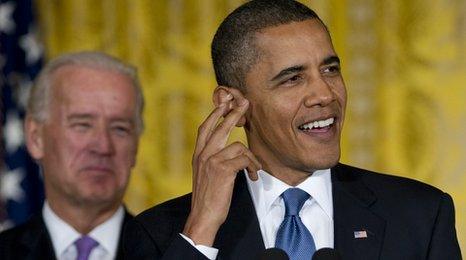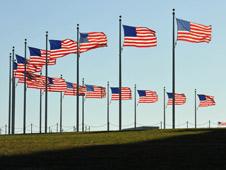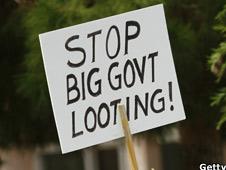What are US midterm elections and what do they mean?
- Published

President Obama approval has dropped to 40% say opinion polls
The US midterm elections are on 2 November but what are they and why do they matter? Newsbeat's US reporter Sima Kotecha answers the key questions.
What are the midterm elections?
They're called that because surprise, surprise they come halfway through the President's four years in office.
Traditionally, they're a referendum on how he's doing and take the political temperature of America.
They were designed to act as a check and balance on the power of the White House.
All 435 seats in the lower House of Congress, the House of Representatives are up for grabs with members elected for two years.
A third of the 100 seats in the Upper House, the Senate, are on the ballot.
Senators are elected for six years at a time. 37 state governors will also be elected.
So what could happen?
President Obama's party, the Democrats, hold the majority in both houses and that means it should be easier for him to pass laws and make changes.

The midterms could cause a significant shift in power in US politics
But he's suffered a dramatic drop in popularity, with some polls giving him an approval rating of less than 40%.
It's likely there'll be many more votes for his opponents, the Republicans.
That will probably mean more of their representatives getting seats and Congress could turn Republican making it harder for President Obama to get things done.
What's the worst that could happen for the President?
This is what they're calling the 'bloodbath' option, tying President Obama's hands and making it impossible to do anything without cutting deals with the Republicans, or using his veto to get his way.
But that's a last resort and will look desperate.
Worst case is that he spends the last two years in the White House looking like a lame duck.
What's all this about the Tea Party? Why does it matter?
The Tea Party isn't really a party but a movement.
It is not a national political party, doesn't officially run candidates and it's name isn't on any ballot papers.

The Tea Party thinks the governnment is spending and taxing too much
It emerged last year as a local force in American politics - traditionalists who think the government spending, taxation and the deficit is too high.
The Tea Party wants a smaller, less powerful government and more power to individuals.
It says it's standing up for ordinary, hard-working Americans.
Critics say they're right wing, racist and anti-government, and the group also worries moderate Republicans because they've beaten several of them for the right to stand in Governor and Congress elections in many areas.
Some Republican Party bigwigs in Washington feel their party is being hijacked by extreme Tea Party supporters.
Final question - why 'Tea Party'?
OK, this is the history bit.
The Boston Tea Party happened in 1773 in the days when America was ruled by Britain.
Colonists destroyed British tea rather than pay a tax they said violated their right to no taxation without representation in a parliament.
Supporters believe the modern day parallel is the President's willingness to raise tax, bail out banks and spend public money without what they see as support or consultation.
Follow Newsbeat's US reporter Sima Kotecha on Twitter, external
- Published20 October 2010
